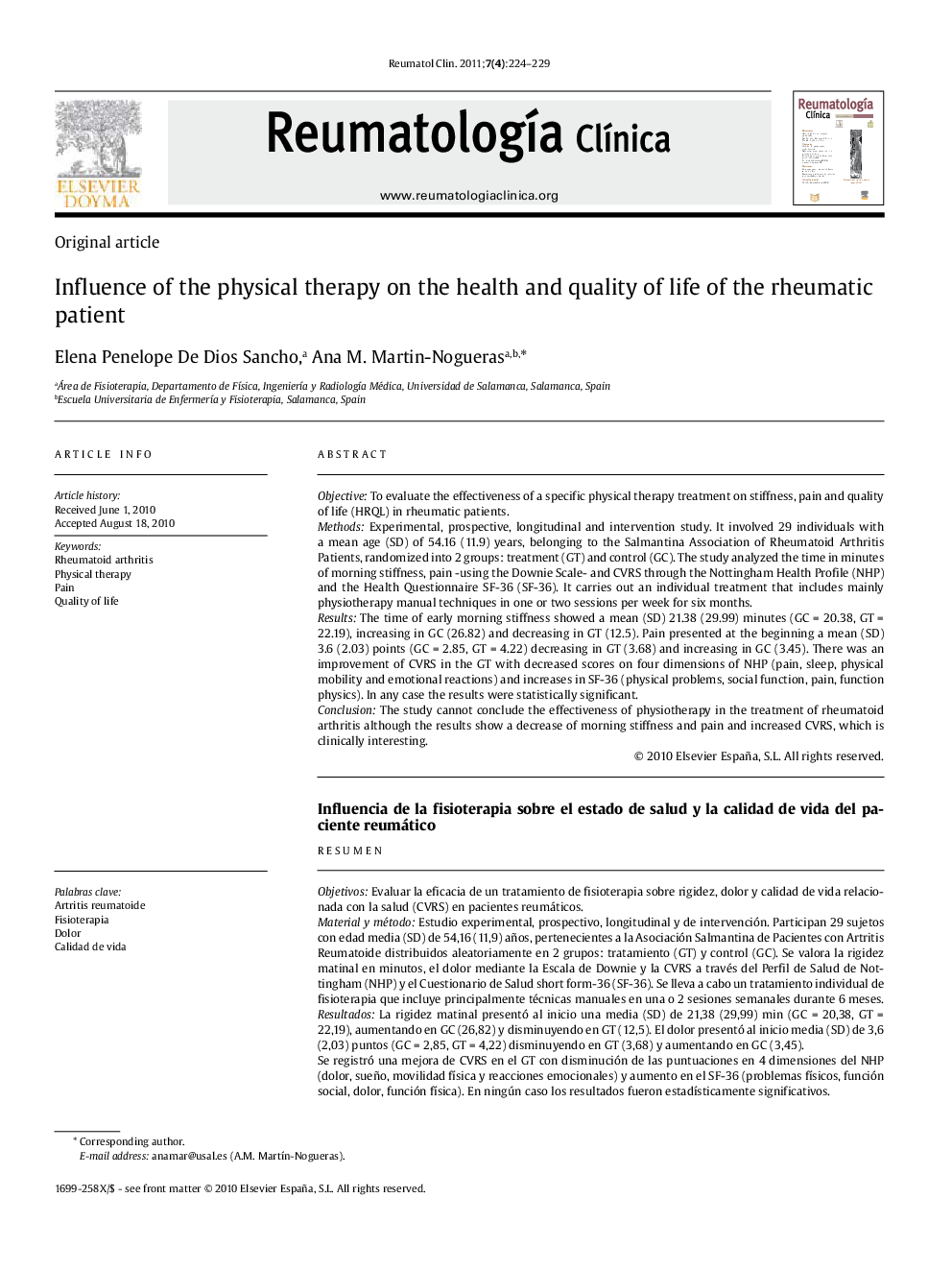| Article ID | Journal | Published Year | Pages | File Type |
|---|---|---|---|---|
| 3384836 | Reumatología Clínica (English Edition) | 2011 | 6 Pages |
ObjectiveTo evaluate the effectiveness of a specific physical therapy treatment on stiffness, pain and quality of life (HRQL) in rheumatic patients.MethodsExperimental, prospective, longitudinal and intervention study. It involved 29 individuals with a mean age (SD) of 54.16 (11.9) years, belonging to the Salmantina Association of Rheumatoid Arthritis Patients, randomized into 2 groups: treatment (GT) and control (GC). The study analyzed the time in minutes of morning stiffness, pain -using the Downie Scale- and CVRS through the Nottingham Health Profile (NHP) and the Health Questionnaire SF-36 (SF-36). It carries out an individual treatment that includes mainly physiotherapy manual techniques in one or two sessions per week for six months.ResultsThe time of early morning stiffness showed a mean (SD) 21.38 (29.99) minutes (GC = 20.38, GT = 22.19), increasing in GC (26.82) and decreasing in GT (12.5). Pain presented at the beginning a mean (SD) 3.6 (2.03) points (GC = 2.85, GT = 4.22) decreasing in GT (3.68) and increasing in GC (3.45). There was an improvement of CVRS in the GT with decreased scores on four dimensions of NHP (pain, sleep, physical mobility and emotional reactions) and increases in SF-36 (physical problems, social function, pain, function physics). In any case the results were statistically significant.ConclusionThe study cannot conclude the effectiveness of physiotherapy in the treatment of rheumatoid arthritis although the results show a decrease of morning stiffness and pain and increased CVRS, which is clinically interesting.
ResumenObjetivosEvaluar la eficacia de un tratamiento de fisioterapia sobre rigidez, dolor y calidad de vida relacionada con la salud (CVRS) en pacientes reumáticos.Material y métodoEstudio experimental, prospectivo, longitudinal y de intervención. Participan 29 sujetos con edad media (SD) de 54,16 (11,9) años, pertenecientes a la Asociación Salmantina de Pacientes con Artritis Reumatoide distribuidos aleatoriamente en 2 grupos: tratamiento (GT) y control (GC). Se valora la rigidez matinal en minutos, el dolor mediante la Escala de Downie y la CVRS a través del Perfil de Salud de Nottingham (NHP) y el Cuestionario de Salud short form-36 (SF-36). Se lleva a cabo un tratamiento individual de fisioterapia que incluye principalmente técnicas manuales en una o 2 sesiones semanales durante 6 meses.ResultadosLa rigidez matinal presentó al inicio una media (SD) de 21,38 (29,99) min (GC = 20,38, GT = 22,19), aumentando en GC (26,82) y disminuyendo en GT (12,5). El dolor presentó al inicio media (SD) de 3,6 (2,03) puntos (GC = 2,85, GT = 4,22) disminuyendo en GT (3,68) y aumentando en GC (3,45).Se registró una mejora de CVRS en el GT con disminución de las puntuaciones en 4 dimensiones del NHP (dolor, sueño, movilidad física y reacciones emocionales) y aumento en el SF-36 (problemas físicos, función social, dolor, función física). En ningún caso los resultados fueron estadísticamente significativos.ConclusiónEl estudio no puede concluir la eficacia de la fisioterapia en el tratamiento de la artritis reumatoide aunque los resultados apuntan a una disminución de la rigidez matinal y del dolor y un aumento de la CVRS, clínicamente interesantes.
